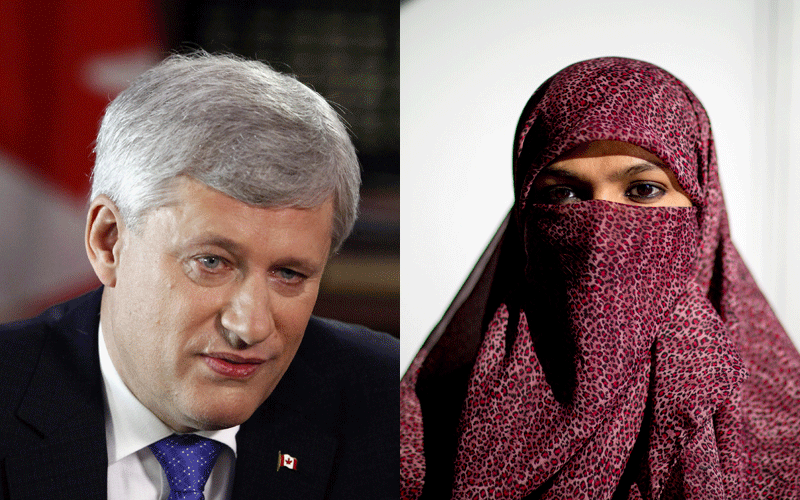Is Harper Hiding Behind the Niqab?

A case could be made for the Conservatives pushing the hot button that is the niqab beyond all common sense or propriety.
It’s an issue that Harper is happily exploiting and a distraction from having to defend his record.
But it’s also likely that if Canadians weren’t responding passionately to the dilemma that the niqab represents, the Tories and everybody else would focus on some other issue.
Let’s face it: the pros and cons of the Trans-Pacific Partnership trade agreement pale in comparison to the conflicting feelings, values and concerns surrounding the niqab.
Those who say it’s just a piece of cloth or a woman’s garment are being disingenuous. It’s a powerful symbol in so many ways.
For feminists, it’s an especially tricky issue,
On one hand, it’s easy to see the niqab as an instrument of oppression of women. Insisting that women must not hide their faces — at least as far as the law can go — is seen as a way to liberate them, allowing women to reclaim their identity and to claim an equal role in Canadian society.
On the other hand, mandating what women can or can not wear may also be seen as a form of oppression.
But there’s more at work here than the double-sided feminist issue.
There’s a movement gathering strength that’s against political correctness and the vaunted Canadian mosaic. Canadians seem to have less patience or tolerance for otherness.
That’s happening, too, in other countries but many of them have had a long history of intolerance. Canada has always been the country where multiculturalism was cherished and tolerance thrived, even between ethnic communities that may have been at each others throats in their home countries. We weren’t a melting pot that obliterated customs, beliefs and traditions brought from other countries.
At least, that’s the way it seemed on the surface.
But the reality is that prejudices and scorn always bubbled underneath, in private homes, private gatherings, private conversations. They were just not allowed to surface in public.
Now it’s as if the dam of political correctness has been breached, for better or for worse.
An argument could be made that it’s for the better, because bringing out into the open the issue of what it means to be a Canadian and how much multiculturalism we want to celebrate or tolerate may not be a bad thing.
But I don’t believe that we can blame (or congratulate) Harper for making that happen. He’s simply found an issue that Canadians are passionate about.